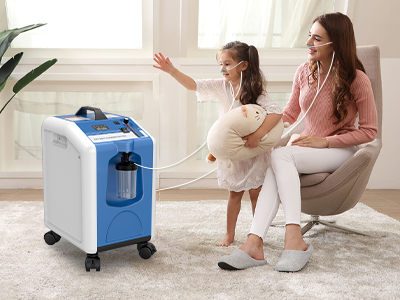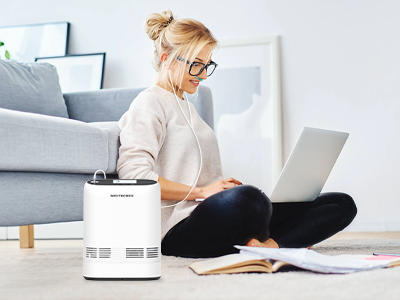21 Jun 2024
Oxygen is vital for life, playing a crucial role in every cell and organ in the body. When a loved one is not getting enough oxygen, their health can deteriorate rapidly. Recognizing the signs of oxygen deprivation is essential to intervene promptly and provide the necessary care.

Understanding Oxygen Deprivation
A. Definition and Basic Concepts
Oxygen deprivation, or hypoxia, occurs when the body or a specific region of the body is not receiving enough oxygen. This can result from various medical conditions, environmental factors, or a combination of both. Hypoxia can lead to severe complications if not addressed promptly.
B. Causes of Oxygen Deprivation
Common causes include respiratory disorders like chronic obstructive pulmonary disease (COPD), asthma, and pneumonia. Cardiovascular issues such as heart failure and anemia can also reduce oxygen delivery to tissues. Environmental factors like high altitudes or pollutants play a role as well.
Physical Symptoms of Oxygen Deprivation
A. Shortness of Breath
One of the most immediate and noticeable signs is shortness of breath. This symptom can occur even at rest or with minimal exertion, indicating that the body is struggling to get enough oxygen.
B. Rapid Breathing
In response to low oxygen levels, the body may increase its breathing rate. This rapid breathing, or tachypnea, is an attempt to draw more oxygen into the lungs.
C. Cyanosis (Bluish Tint)
Cyanosis is a bluish tint to the skin, lips, or nail beds, signaling that there is insufficient oxygen in the blood. This is a critical indicator and often necessitates urgent medical attention.
Cognitive and Behavioral Symptoms
A. Confusion and Disorientation
When the brain does not receive enough oxygen, cognitive functions can become impaired. Symptoms include confusion, disorientation, and difficulty understanding or responding to questions.
B. Restlessness and Anxiety
A lack of oxygen can also affect mood and behavior, leading to restlessness and anxiety. Your loved one may appear agitated or unusually nervous without a clear cause.
C. Difficulty Concentrating
Hypoxia can cause difficulties with concentration and memory, making it hard for your loved one to focus on tasks or recall information.

Chronic Symptoms to Watch For
A. Persistent Fatigue
Chronic hypoxia often manifests as persistent fatigue. Despite adequate rest, your loved one may feel constantly tired and lack the energy to perform daily activities.
B. Frequent Headaches
Recurring headaches can be a sign of low oxygen levels. These headaches may be more intense in the morning and improve as the day progresses.
C. Chest Pain
Chest pain or discomfort, especially during physical activity, can indicate that the heart is not receiving enough oxygen. This symptom should never be ignored and warrants immediate medical evaluation.
Risk Factors for Oxygen Deprivation
A. Respiratory Conditions
Conditions like COPD, asthma, and interstitial lung disease can impair the lungs' ability to oxygenate the blood, increasing the risk of hypoxia.
B. Cardiovascular Diseases
Heart conditions that affect blood flow, such as coronary artery disease or heart failure, can reduce oxygen delivery to tissues and organs.
C. Environmental and Lifestyle Factors
Smoking, exposure to pollutants, and living at high altitudes can also contribute to lower oxygen levels. Lifestyle choices that affect lung health and overall fitness are significant risk factors.
Monitoring and Assessing Oxygen Levels
A. Use of Pulse Oximeters
Pulse oximeters are non-invasive devices that measure blood oxygen saturation. They are easy to use and provide real-time data on your loved one's oxygen levels.
B. Arterial Blood Gas (ABG) Tests
For a more detailed analysis, arterial blood gas (ABG) tests can measure the amount of oxygen and carbon dioxide in the blood. This test is typically performed in a clinical setting.
C. When to Seek Medical Help
If you observe any signs of oxygen deprivation, it is crucial to seek medical attention immediately. Early intervention can prevent serious complications and improve outcomes.
Preventative Measures
A. Healthy Lifestyle Practices
Encouraging a healthy lifestyle, including a balanced diet, regular exercise, and avoiding smoking, can improve lung and heart function, reducing the risk of hypoxia.
B. Managing Chronic Conditions
Effective management of chronic conditions such as asthma, COPD, and heart disease is essential. Adhering to treatment plans and regular check-ups can help maintain adequate oxygen levels.
C. Regular Medical Check-Ups
Routine medical examinations can detect early signs of oxygen deprivation and other health issues, allowing for timely intervention and management.
Conclusion
A. Recap of Key Points
Understanding and recognizing the signs of oxygen deprivation in your loved ones is vital. Monitoring physical, cognitive, and behavioral symptoms can ensure timely intervention and proper care.
B. Importance of Vigilance and Proactive Care
Maintaining vigilance and being proactive in managing health conditions can prevent serious complications. Ensuring adequate oxygen levels is crucial for the well-being and quality of life of your loved ones.
Keywords: oxygen
Originally published 21 Jun 2024, updated 21 Jun 2024.